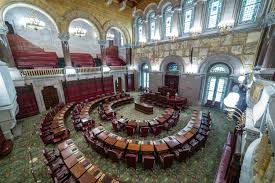New York Lawmakers at Budget Impasse

Amidst the coronavirus crisis, New York lawmakers returned to Albany with the intention of passing a state budget (which is really a series of bills) for the new fiscal year by the April 1 deadline, but that didn’t happen and an extension was passed. Around midnight Tuesday night/Wednesday morning, both the State Senate and Assembly adjourned, leaving the state’s fiscal situation in limbo.
New York’s budget process has always been opaque and the coronavirus outbreak in the state has only further complicated matters. Governors and legislators alike often use the budget to enact laws and regulations, often added at the last second, that would be difficult to pass as standalone bills. Last year, the budget included congestion pricing, the plastic bag ban, and the mansion tax.
Governor Cuomo’s proposed budget, as of now, includes cuts to education and healthcare spending. Even before the crisis, the state faced a budget gap, which the governor planned to solve primarily through shifting Medicaid costs onto localities, such as New York City, which would be a significant burden. These previously-announced proposed cuts have faced increased scrutiny from the Working Families Party and other activist groups in the wake of the global pandemic. Elmhurst Hospital in Queens, which has been among the hospitals hardest hit by the coronavirus outbreak, is set to lose $10 million in state funding, if the governor’s proposals pass.
2020 began as a difficult year politically for Governor Cuomo. At the start of the year, the contentious bail reform fight appeared that it would consume that year’s agenda. Republicans and law enforcement groups have been lobbying for a roll back on bail reform, which passed last session, since before the law came into effect. With moderate voters against the bill, the governor announced his support for changing the reforms. This in turn angered progressive members of his own party, many of whom have become louder and more frequent in their criticisms of Cuomo on a myriad of issues. These calls have only grown louder since Cuomo successfully fended off a primary challenge from Cynthia Nixon in 2018.
According to a Siena College poll, in February, the governor stood at a -6% net approval rating (44% approve to 50% disapprove). Gov. Cuomo appeared to be losing his ability to control the agenda in Albany and was talking about the need for reframing the narrative in late February. However, Cuomo’s handling of the coronavirus outbreak has drawn national and local praise, which has been reflecting in his approval numbers. A poll this week from Siena showed him with a +48% net approval rating (71% to 28%). This 54-point swing in the span of less than two months brought the governor from a low-point of his tenure to his highest mark since January 2013, which it should be noted was in the wake of Hurricane Sandy. Governor Cuomo appears to do his best, in the public’s estimation, in times of crisis.
This return to popularity, as well as the urgency of the crisis, has given the governor a renewed influence over the budget process. The State Legislature likely would have spent the last month having tentious debates about bail reform, marijuana, and spending cuts, among other things, which would have been politically-damaging to Cuomo’s Democrats in a year when every legislator will be on the ballot.
Instead, the governor will likely be able to get his way on most issues. On bail, for instance, Cuomo’s fix is still in the proposed budget. Cuomo’s changes would eliminate cash bail entirely (it is still currently allowed for felonies and some misdemeanors), but would allow judges to consider a defendant’s “dangerousness” when considering whether to release them. Marijuana legalization, meanwhile, has been dropped. Many details remain up in the air at the moment.
Democrats in the Legislature to Cuomo’s left have been calling for tax increases on the wealthiest New Yorkers to close the budget gap, instead of spending cuts. Assemblymember Harvey Epstein (D-Manhattan), among others, has called for a one-percent increase in state taxes on New York’s top 1% of earners.
New York is set to receive $6 billion in increased federal assistance from the $2-trillion emergency stimulus bill passed last week, but that likely will not cover all of the state’s increased expenditures resulting from the virus. With no guarantee of any further federal help, the state will likely have to shoulder much of the costs incurred. Furthermore, the MTA derives much of its budget from fare collection (needless to say, fares have dropped as almost no one has been using public transit lately) and might need a bailout itself in the near future.
The state government will have to make some tough fiscal decisions soon and, so far, has not been able to reach a consensus on those questions yet.

